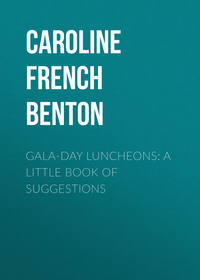 полная версия
полная версияLiving on a Little
To offset these difficulties, however, there were some advantages, advantages over the city market, even. By watching the calves brought in, Mary could select the largest one and insist that her meat must be cut from that. Then she would also secure the liver for almost nothing, and the sweetbreads and brains for a song; as she predicted in the winter she would find, the farming community did not appreciate these things as she did. The liver she roasted after larding it, and it made a delicious dinner, while the left-over appeared the next night as mock terrapin and was equally good. The sweetbreads and brains were of course among their choicest dishes. Sometimes on a Sunday night they had a salad of them served on lettuce with mayonnaise.
The mutton she bought occasionally, for it was cheap, too, but she always parboiled it before roasting it, and put considerable seasoning in the dish to disguise the woolly flavor she perhaps imagined she noticed. Once cold, however, this disappeared, and the meat was a welcome change from the other things she could get.
Though the beef was really almost worthless in the condition in which it appeared in the shop, as it was coarse and tough and not ready to eat, this Mary also made palatable. She would buy a piece off the round, and put it through her own meat-chopper to ensure having it clean. This then appeared as Hamburg steak, surrounded by all sorts of vegetables, small piles of tiny carrots, little beans and fresh peas setting the brown meat off by their alternating colors. Or she cut the beef up into finger lengths and stewed it long and slowly in the tireless stove, putting in barley and tomatoes and other good things till it came out a delicious, rich, and nourishing stew. When she could get a beef's tongue, she always rejoiced, for one night it was braised with vegetables, and another the slices left over were set in an aspic jelly, and a third the rest was chopped, creamed and slightly baked, and the whole cost little as compared to what she would have had to pay in town, where tongue was an extravagant meat.
When a chicken could be found which promised to be tender, that was purchased, not at twenty-two cents or thereabouts, as it would have been in the city, but for fifteen cents. This was usually split up the back and panned for Sunday dinner. When an old fowl was purchased for jellied chicken for hot nights, it was first stewed to rags, then imbedded in its own stock, strained and set with gelatine, and it came out tender in spite of itself.
As to fish, once in awhile they could get something from the river. A fish-man drove a wagon past the door, but as he asked city prices for what he had, and as there was always some doubt as to just what day the fish had originally appeared on sale, these they never purchased. The little perch and sunfish small boys brought straight from the water, strung on twigs and still dripping, they did buy, and found them excellent for a change, though after the skin and bones were removed there was little left of the fish.
As to groceries, there had been a good deal of trouble at first. The coffee and tea at the post-office-shop were too poor to use; the spices were distinctly stale; crackers were to be had only in broken bits from the common barrel. Butter was almost as expensive as in town, and not very good even so; too often it was pale, and the buttermilk exuded in tiny drops here and there. Eggs were a constant source of anxiety; they were not only much more expensive than they should have been, according to Mrs. Thorne's ideas, but they were of all ages, and so mixed at the store that it was impossible to decide which would do for breakfast and which would not, until, by breaking several, one after the other, it was found that all were about equally stale.
To make housekeeping easy, it was necessary to hunt up a farmer's wife who made really good butter and would promise to deliver it weekly. This arrangement proved the solution of that difficulty. Sometimes, when the weather was cool, Dolly would take the cream-whipper, and using the sweet cream she could occasionally get for a small sum, she would turn out enough delicious unsalted butter to make the next day's meals a delight.
The egg problem had to be solved in the same fashion as the butter problem. A farmer had to be found who would bring in a dozen eggs or more a week, provided he had them; too often he came supplied with only half as many as they wished to have, hens being obdurate at the time. This meant that they had then to be very economical for awhile, till the wretched fowls returned to business.
Most of the groceries had to be ordered from town, for their coffee and tea must be good, and a certain number of packages of crackers and fancy biscuit, with salmon, olives, spices, chocolate, gelatine, raisins and some tins of olive oil, were ordered with them. The staples, flour, sugar, rice, salt, corn-meal and such things, they bought from day to day, as they were needed, at the local grocery.
Ice continued to arrive on schedule time, but as it was almost as dear as at home, they had to use it carefully. The water was bottled and put on it in the refrigerator. Tea and coffee were treated in the same way, so that they could all be used without adding any ice from the block, except perhaps a small bit in each glass. They kept the one large piece carefully wrapped up, to prevent its melting, in defiance of the advice of most household teachers of housekeeping, who had declared that the truest economy consisted in letting the ice melt as it would, in order to best preserve the food. They found that the food still kept from day to day when the ice was wrapped, and just half as much had to be bought as when it melted at its own sweet will. When they had ice-cream they made only a small quantity at a time by having a little freezer, and breaking only as much ice as they really needed. They made more sherbets than any other frozen dainty, and for these they used fruit from the garden; raspberry, cherry and currant ices took little from the family purse. When cream was used, it was made into mousse, and of course frozen in the tireless stove. This useful article, by the way, was not brought from town, but constructed out of a wooden candy-pail with hay-filled pads; it took only a morning of the sisters' time, and no money at all to make.
One warm afternoon Dolly roused herself from a reverie in the hammock and suddenly said to Mary, "This place reminds me of the seashore!"
"Because it's so different, I suppose."
"Exactly; you have guessed it. The reason why I was reminded of the seashore in the first place, however, was the distant view I get from here of the fish-man's wagon disappearing down the road, and the thought of the shore suggested the summer we all spent there together before you were married. I was wondering whether you knew much about housekeeping then, and how you found living there compared with living here."
"I really did not do any housekeeping then, but four years ago Dick and I spent three weeks there visiting a friend, and I learned all about the way prices ran from her; she was a splendid manager, too."
"Well, what do you think of the difference between it and this place?"
"It's as wide as the sea itself. In the first place, unless you go to a very primitive spot, you will find the fish is nearly all sent to town, and you must pay city prices for what you can get. That is the first great disillusionment you meet with. Bluefish and lobsters and all, even down to flounders, are no longer cheap if the place is near enough a railroad to permit an easy shipment to town. Clams are usually an exception, and if you can live largely on these, you will find they cost little. We used to ring the changes on chowder, minced clams on toast, and clam broth."
"Do you mean hard-shelled clams or soft?"
"Hard shell; quahaugs, they are called locally. Soft-shell clams you can dig yourself in many places; and if you go to the seashore, do try and find out in advance how the supply is, for freshly dug clams that cost nothing, and can be steamed or made into clam fritters and other good dishes, are indeed a boon to those who must live on a little by the sea."
"And how about groceries and such things?"
"They are all high; city prices again. You must really take down some good dry things yourself to help out, just as we do here. And butter and eggs are very expensive, for the climate at the seaside never seems to agree with either cows or hens; they are scarce. So eggs and butter and milk are all costly."
"And meat, I suppose, is, too."
"Meat is frightfully dear if you go to any place where it is sent down from the city. If it is not, but is bought at a butcher shop at the nearest place, it is the same sort of thing we get here – poor, distinctly poor, my dear."
"On the whole, then, you do not recommend the seashore as an economical place to spend the summer in."
"Not unless you go to an unfashionable place a long way off. Then if you get a furnished cottage, and can get clams by digging them and fish by catching it, or getting it of a fisherman who does not find it in demand elsewhere, you can really live on a little. Of course you will not have milk, nor eggs, nor vegetables nor fruit, except in homœopathic doses, but then, it will be cool and refreshing as to climate, and the rest will doubtless do your weary brain a great deal of good."
"Doubtless. But I think, as long as I am poor, I shall take my vacations among the hills; it must be cheap there."
"Then you must rent your apartment in town or board in the country, for you can't well rent two places at the same time. You can get a cheap place in certain farmhouses in the hills not too near the city, but often they are not so very comfortable, to our ways of thinking."
"But certainly, if I rent the apartment and take a small house, I shall find food cheap enough."
"Just about as it is here: vegetables and fruit will be cheap, and meat poor, and ice probably hard to be had. But milk will be inexpensive, and probably eggs and butter, too."
"The farther off you get the more it costs to live, if one is to go by prices in the Adirondacks, or similar remote spots. I remember going there once and staying in a camp, and everything had to be brought by pack, and I knew it must cost heaps to get such things as vegetables and eggs and city groceries."
"Yes, such places are costly if you try and live as you do at home. I believe the only way to manage is to accommodate yourself as far as possible to the place you are in. That is, here we do not send away for anything but groceries, and only one box of those in a summer; we eat the local meat, and if we had no garden we could buy vegetables of our neighbors. At the seashore you must live on what is there; not meat and vegetables, but fish you can catch for yourself and clams you can dig. In the hills, put up with discomforts and look at the sunsets. Don't try and have city meats, but when the farmer kills an animal, take what you can get of it and be thankful, and make it up on vegetables and blueberries and such things."
"But taking this summer as a whole and comparing it with life in the city and elsewhere, would you not say that the country is about the best place of all to live in? It seems to me that it is. Living has been very cheap this summer, hasn't it?"
"Yes, very, but remember that we pay no rent here, and have a garden. Suppose we hired a cottage and had to have a garden made. That would be another story, for the first year at least. I suppose after that the garden part would be less expensive. Then remember that there are two of us to do the work; you alone without a maid would find it much harder to get along. And then in summer, it is lovely anywhere in the country, but think of this place in winter, with snow piled up high and nobody to dig walks except a husband who has only brief mornings and evenings to do it in. Then the problem of heating the house! No, I do not believe I should find it easy to live here in the winter."
"Oh, I did not mean here; I meant in some nice suburb not too far from town."
"Well, rents are high in any nice place, and you have to have a furnace man and somebody to shovel snow just as you would have here. Beside, food is always very expensive in a suburb; you have to pay city prices for everything."
"Well, is the last word that the city is the only place to live in economically?"
"Not at all. I hope I could live economically anywhere. But if you do live in town in an apartment, you get your heating done without trouble on your part, and you can buy any sort of food at any price you choose to pay. If you want cheap meat you can get it, and it will be of a good kind, not the poor stuff we have here. Vegetables and fruit are as cheap in summer in town as they are anywhere, provided you have to buy them in the country. You have to spend car-fares there, and here you have a commutation ticket to get. My mind is exactly where it was before we came out here for the summer. It is not the place you live in, it is the way you live that makes things come out even. Don't pay more rent than you can afford; don't spend more on your table than you can afford; watch your small outgoings; keep down Incidentals. If you observe these rules, Dolly, I am sure you will come out right in the end wherever you are. Live in the country if you choose; there are lots of compensations for the extra care of the fires and the snow in the winter. Think of the lovely summer we have had here. That would be worth a long cold winter, I really believe. Or, live in a suburb and have a good time socially – I believe you get more gaiety of a nice kind in a small place than in town. But if you do, be very, very careful, for it is extra hard there to live on a little. If you live in an apartment in town, economize all winter, for no one will be the wiser, and spend the money you save in an outing in summer of some sort. That is my advice after trying living in all sorts of places."
"Well, I'll consider the subject later on. Meanwhile, tell me truly: have you saved as much money as you expected to when we came out here?"
"Yes, quite as much. Meat has cost little, and vegetables still less, in spite of the wages of the weeding boy. Fuel has been low; milk less than in town, and butter and eggs no more here than there. Fruit has been almost nothing at all, and though we have done up so much, the sugar has not been so very expensive, because we bought that by the half-barrel and saved a good deal so. On the whole, I am more than satisfied, and we will have a snug little sum left over after we put back what we took out of Incidentals when we came."
"And next time we will have a cow and make all our butter," said Dolly.
"And we will surely have hens, too," said her sister. "That is, we will have them if we can; I am not sure we could invest in any for one summer alone, though I do sigh for plenty of eggs and broilers. I have heard, however, that hens are expensive and unsatisfactory in the hands of a novice, so we won't order any in advance."
When Mr. Thorne came home at night he had two letters in his pocket which proved of amazing interest.
One was Dolly's regular letter from South America, but it conveyed the joyful news that the end of probation was at hand and it was about time to begin ordering the trousseau for an early wedding. The other letter was from Aunt Maria, and said that her sister was ill and she should not return in the autumn, and the family was to have whatever they could take home from the garden. These things naturally made the breaking up of the little home very exciting.
"We will take all the potatoes," said Mary as they looked over the outdoor supplies still uneaten. "We will have those put in two barrels, and have one apiece for you and ourselves. The squashes we will take too, and the onions and turnips and beets, and all those things. The parsley we will plant in boxes for the kitchen windows, and the apples we will take every one."
"And may a mere man inquire where on earth you are going to store all these things in our flat?" asked her husband. "The barrel of potatoes can stand in the dining-room, to be sure, and the apples in the parlor, but the squashes and turnips will have to go in your dress-boxes under the beds."
"No, they won't. We will take everything to town that we can and divide them up. The janitor can keep our barrels in the basement and bring up one at a time, and I will put the other things in baskets and pile those one on top of the other in the corner by the refrigerator, or some other place."
"Some other place will be better," said Dick.
"Well, of course I realize that they will not keep forever, Dick Thorne, but I shall take every single thing I can find, for all that, and we will eat them up as soon as possible. Still, it is maddening not to have more room to store things in a city apartment. Now in the country we should have a root cellar, Dolly, and put lots of them out there, and have them come in all winter when we needed them. And of course potatoes and apples and squashes we could put down cellar and they would be all right there. Isn't it too provoking we can't do that way in town? I declare it is enough to make me determine to stay on here till spring."
"Do," said her husband encouragingly. "Shovelling snow is said to be the finest exercise in the world, and you can do it at odd moments when you are not stoking the kitchen fire. I should have to catch the early train in the morning, and it would be dark when I came back, so I could not help you, unfortunately, much as I should regret the fact. But I am sure it would do you all the good in the world."
"Some other winter," laughed his wife. "The next thing is to get Dolly married, and we must go back to get that over. Father and mother will be home soon, too, and that is another reason for our leaving. But it has been a lovely summer; we shall always remember it, I am sure."
"It has been a lovely year all through," said Dolly. "I can't tell you how grateful I am for your taking me in. And do you – now honestly, Mary – do you think I know enough to keep house all by myself?"
"I have my doubts, Dolly dear," her brother broke in. "On the whole I think Fred had better put off coming home for awhile. I shall write him to-morrow in any case, and I shall tell him so and save you the trouble."
"There won't be time for a letter to reach him, unfortunately," Dolly replied with a most becoming blush. "He is coming right away – about next week, he thinks. So, Mary, you see why I am anxious to know whether I can keep house or not. Do tell me honestly."
"I can conscientiously give you a diploma, my dear, so don't worry. You really and truly have learned to live on a little."





